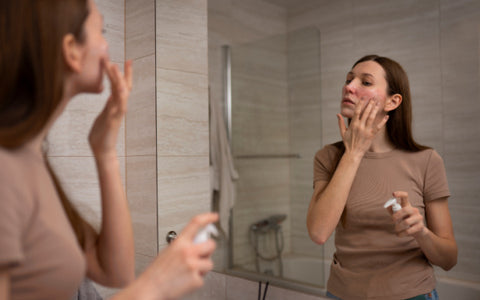
Hello, beautiful! Today, let's delve into the world of skincare and discuss a topic that affects millions around the globe: Rosacea. This chronic skin condition might sound intimidating, but fear not! In this guide, we will explore what rosacea is, its symptoms, who is most susceptible, the causes, triggers, prevention tips, and effective ways to manage and calm this condition down. So, let’s embark on this enlightening journey to understand your skin better!
What is Rosacea?
Rosacea is a common but often misunderstood skin condition that primarily affects the face. It’s characterized by redness, visible blood vessels, swelling, and sometimes acne-like breakouts. While it’s not life-threatening, it can significantly impact your self-esteem and confidence. The exact cause of rosacea remains a mystery, but various factors contribute to its development and flare-ups.
Recognizing the Symptoms
How do you know if you have rosacea? Look out for persistent redness in the central part of your face, including the cheeks, nose, chin, and forehead. You might also notice visible blood vessels, swelling, and a tendency to blush or flush more easily than others. In some cases, rosacea can lead to pimples, and in advanced stages, the skin might thicken, leading to a bumpy texture.

Image credit: Freepik.com
Who is Most Prone to Rosacea?
Rosacea doesn’t discriminate; it can affect anyone. However, it’s more commonly observed in individuals with fair skin, especially those of Celtic or Scandinavian descent. Additionally, women are more likely to develop rosacea, but when it occurs in men, the symptoms tend to be more severe.
What Causes Rosacea?
The exact cause of rosacea remains elusive, but genetics, environmental factors, and certain lifestyle choices play a significant role. Individuals with a family history of rosacea are more predisposed to the condition. Additionally, factors like abnormal reactions in blood vessels, mites on the skin, and a type of bacteria known as H. pylori might contribute to its development.
What Triggers Rosacea Flare-ups?
Understanding the triggers is crucial in managing rosacea effectively. Common triggers include spicy foods, alcohol, hot beverages, extreme temperatures, sunlight, stress, and specific skincare products. Identifying and avoiding these triggers can significantly reduce the frequency and intensity of flare-ups.
Preventing Flare-ups: Your Shield Against Rosacea
Preventing rosacea flare-ups involves a combination of lifestyle changes and mindful skincare practices:
1. Gentle Skincare Routine: Opt for mild, fragrance-free cleansers and moisturizers. Harsh products can irritate the skin, aggravating rosacea symptoms.
2. Sun Protection: Shield your skin from harmful UV rays by wearing hats and using a broad-spectrum sunscreen and reapplying every 2 hours, even on cloudy, rainy, or snowy days.
3. Dietary Choices: Identify and avoid food triggers such as spicy foods and alcohol. Opt for a balanced diet rich in fruits, vegetables, and whole grains.
4. Stress Management: Practice relaxation techniques like yoga, meditation, or deep breathing exercises to manage stress, a common trigger for rosacea.
5. Temperature Control: Stay cool in hot weather and bundle up in cold weather. Sudden changes in temperature can exacerbate symptoms.
Clearing Up Rosacea: Calming Your Skin
While there is no permanent cure for rosacea, several treatments can effectively manage and calm the condition:
1. Prescription Medications: Dermatologists often prescribe topical creams or oral antibiotics to reduce inflammation and control acne-like breakouts.
2. Laser Therapy: Intense Pulsed Light (IPL) and other laser therapies can target visible blood vessels, reducing redness and swelling.
3. Skincare Products: Use gentle, hypoallergenic skincare products designed for sensitive skin. Look for ingredients like chamomile, aloe vera, and green tea extract, known for their calming properties.
4. Natural Remedies: Some natural remedies, such as chamomile tea compresses and aloe vera gel, can help soothe the skin. However, it’s essential to consult a healthcare professional before trying any home remedies.
5. Mindfulness and Stress Reduction: Since stress is a significant trigger, practices like yoga, meditation, and mindfulness can help in managing and calming rosacea symptoms.
Rosacea might pose challenges, but armed with the right knowledge and skincare routine, you can effectively manage and calm its symptoms. Remember, each person’s skin is unique, so what works for one might not work for another. Don’t hesitate to consult a dermatologist who can provide personalized advice tailored to your specific needs. Embrace your skin, take care of it with love and patience, and remember, your beauty shines from within, rosacea and all!
Cover image credit: Freepik.com


